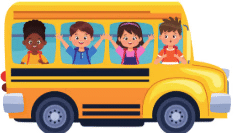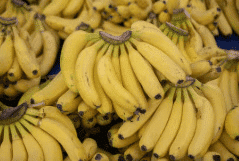Class 4 Maths Worksheet Solutions Chapter 13 The Transport Medium
Q1: Multiple Choice Questions
1. What is the product of 15 × 14?
a) 200
b) 210
c) 220
d) 230
Answer: b) 210
Solution: Break it down: 10 × 14 = 140 and 5 × 14 = 70. Add them together: 140 + 70 = 210.
2. Which of the following is equal to 24 × 100?
a) 240
b) 2,400
c) 24,000
d) 240,000
Answer: b) 2,400
Solution: Multiplying by 100 adds two zeros to the number: 24 × 100 = 2,400.
3. A bus can seat 20 people. How many people can 12 buses seat?
 a) 220
a) 220
b) 240
c) 260
d) 280
Answer: b) 240
Solution: Multiply 12 × 20:
12 x 20 = 240
4. What is the remainder when 324 is divided by 14?
a) 2
b) 4
c) 6
d) 8
Answer: a) 2
Solution: 14 × 23 = 322. Subtract from 324: 324 - 322 = 2, so the remainder is 2.
Q2: Answer the Following Questions
5. Solve: 11 × 200.
Answer: 2,200
Solution: Break it into simpler parts: (10+1) x 200
10 × 200 = 2,000
1 × 200 = 200.
Add them: 2,000 + 200 = 2,200.
6. Calculate: 40 × 50.
Answer: 2,000
Solution: Think of 50 as half of 100.
So, 40 × 100 = 4,000,
then halve it: 4,000 ÷ 2 = 2,000.
7. Find the product: 16 × 100.
Answer: 1,600
Solution: Multiplying by 100 means adding two zeros:
16 × 100 = 1,600.
8. Divide: 400 ÷ 20.
Answer: 20
Solution: Break it down: 400 ÷ 10 = 40,
then 40 ÷ 2 = 20.
9. Solve: 7 × 25.
Answer: 175
Solution:
Multiply 7 x (20 + 5)
7 × 20 = 140 and
7 × 5 = 35.
Add them: 140 + 35 = 175.
10. What is 30 × 200?
Answer: 6,000
Solution: Multiply 3 × 2 = 6, then add three zeros: 6,000.
Q3: Word Problems
11. A train has 24 coaches, each carrying 72 passengers. How many people can travel on the train?

Answer: 1,728
Solution: Multiply 24 × 72 as (20+4) x 72
20 × 72 = 1,440
4 × 72 = 288.
Add them: 1,440 + 288 = 1,728.
12. A brick kiln produces 125 bricks daily. How many bricks are made in a 30-day month?
Answer: 3,750
Solution: Multiply 125 × 30: (100 + 25) x 30
100 × 30 = 3,000 and
25 × 30 = 750.
Add them: 3,000 + 750 = 3,750.
13. 870 bananas are packed in bunches of 10. How many bunches are there?
Answer: 87
Solution: Divide 870 by 10: 870 ÷ 10 = 87.
14. A school trip has 36 students and 6 teachers. Each bus seat fits 2 people. If there are 25 seats, are there enough seats?
Answer: Yes
Solution: Total people = 36 + 6 = 42.
Seats needed = 42 ÷ 2 = 21.
Available seats = 25, so there are enough.
15. ₹1,000 is divided equally among 10 grandchildren. How much does each get?
Answer: ₹100
Solution: Divide 1,000 by 10: 1,000 ÷ 10 = 100.
16. If 64 flights carry 152 people each, how many people were there in total?
Answer: 9,728
Solution: Multiply 64 × 152: (60 + 4) x 152
60 × 152 = 9,120 and
4 × 152 = 608.
Add them: 9,120 + 608 = 9,728.
17. A boat ride costs ₹1,200 for 8 people. What is the cost per person?
Answer: ₹150
Solution: Divide 1,200 by 8: 1,200 ÷ 8 = 150.
18. A bus ticket costs ₹60, and a boat ride costs ₹1,200 for 8 people. What is the total cost per person?
Answer: ₹210
Solution: Bus cost = ₹60.
Boat cost per person = 1,200 ÷ 8 = ₹150.
Total = 60 + 150 = ₹210.
19. A snake boat is peddled by 128 people. How many people are needed for 5 such boats?
Answer: 640
Solution: Multiply 128 × 5: (100 + 28) x 5
100 × 5 = 500 and
28 × 5 = 140.
Add them: 500 + 140 = 640.
20. Compare: 15 × 100 vs. 15 × 200. Which is greater?
Answer: 15 × 200
Solution: 15 × 100 = 1,500 and 15 × 200 = 3,000.
3,000 is greater than 1,500.
FAQs on Class 4 Maths Worksheet Solutions Chapter 13 The Transport Medium
| 1. What is a transport medium? |  |
| 2. Why are transport mediums important in science? |  |
| 3. What types of transport mediums are commonly used? |  |
| 4. How do you prepare a transport medium? |  |
| 5. Can transport mediums be reused? |  |
















